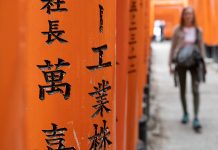<< back to foods in Washington, D.C.
What: It’s said that Washington, D.C. is the second-largest Ethiopian city in the world, second only to Addis Ababa. An estimated 250,000 Ethiopians live here, many of them asylum-seekers from the 1990s, when Ethiopia was engaged in the civil war that led to Eritrea’s independence (interestingly, many who came here as Ethiopians are now Eritrean). Naturally, over time this has meant that a good deal of Ethiopian restaurants have sprung up to serve the needs of these immigrants, and anyone else who wanders in seeking real Ethiopian food—very good news for locals and visitors alike.
For the uninitiated, Ethiopian cuisine features a lot of vegetables, lentils, and spicy meats served atop a giant round of soft spongey flatbread called injera, which gets its tangy taste from its base of water and teff flour (made with a gluten-free, vitamin-rich supergrain indigenous to northeastern Africa), left to ferment for a few days. The injera acts as both plate and eating utensil—using your right hand, you tear off some injera and scoop up your food. It is the most essential part of any Ethiopian meal, quite literally providing its foundation.
Understanding that, you can easily experiment with various veggies, lentils, and meats on the menu, from wats (a category of dishes that are, at heart, spicy braised meat and vegetable stews, simmered in niter kibbeh, a spiced clarified butter, and awaze sauce, made with key spice mix berbere) and tibs (another big category of dishes, basically sautéed meat with veggies) to the tartare-like kitfo, a raw-beef dish of lean meat marinated in niter kibbeh and matmita, a finely ground spice containing African bird’s-eye chiles, cardamom seeds, cloves and salt.
Good to know: The “Little Ethiopia” part of town centers around U Street between 9th and 13th Streets; there’s no signage or official designation, however, due to the same area’s important African-American heritage.
Where: Family-owned Zenebech Restaurant (2420 18th St. NW, map) started life in 1993 as an injera bakery, so you know it’s got some serious cred on the flatbread front. In 1999, it relocated and expanded to offer takeout; in 2017 it moved again, to Adams Morgan.
When: Mon-Fri, 5pm-11pm; Sat, 11am-midnight; Sun, 11am-11pm
Order: Pictured, on a bed of injera,is the vegetarian combo ($10); a bowl of awaze tibs with hunks of lamb ($11.75); and a pile of banatu ($11; tibs ferber—beef sautéed with awaze sauce cooked with pieces of injera—mixed with kitfo, homemade ibe (cottage cheese), and a hard-boiled egg) in the center. The veg combo, laid around the outside of the plate, consisted of (clockwise from top) yellow split peas, spicy red lentils, an excellent mix of cabbage-potato-carrot, a tomato and jalapeño salad, collard greens, and spicy shiro, a chickpea stew.
It was a lot of food, to say the least, and such a great variety of flavors and textures to keep the taste buds entertained. We particularly loved the rich, deep-red awaze sauce, made here with berbere, oil, garlic, and onion, and the addition of cottage cheese to the banatu, a beautifully cooling element to all the flavor-forward spice. Pair your meal with some Ethiopian honey wine or a Harar-brewed Hakim Stout.
Good to know: Most Ethiopian restaurants in the U.S. serve injera made from a mix of domestic-grown teff flour and wheat flour, as teff is expensive to produce here and it’s banned for export from Ethiopia to keep local prices down in the face of rising global demand. The injera that Zenebech makes daily is this teff-wheat mix, but it’s also one of a small handful of D.C. restaurants to offer “real” injera, imported from Ethiopia and made with 100% teff. (Because of the ban, the bread itself is shipped frozen from Ethiopia.) At Zenebech, you have to request the Ethiopian stuff, which costs an additional $2.50, and is, by the way, gluten-free. It’s worth a try—darker in color, it has a thinner, less-spongey consistency (possibly from having been frozen) and a more pronounced sour taste.
Alternatively: Among the beloved Ethiopian landmarks in town is live-music venue Dukem (1114-1118 U St. NW, map), where the large menu includes Ethiopian breakfasts. Speaking of breakfasts, don’t miss the cozy Eritrean diner Keren (1780 Florida Ave. NW, map), which does wonderful breakfasts and tea; Chercher Ethiopian Restaurant and Mart () is another good option, specializing in Western Ethiopian food. Over on H Street there’s the classy, trendy Ethiopic (401 H St NE, map), often cited (in recent years) as among the city’s best in this category.
There has never been a better time to plan your next trip and make your Dream vacation a reality . Whether you've been dreaming of relaxing on a sun-kissed beach, exploring ancient cities, or embarking on an epic adventure, now is the perfect moment to make it happen.













